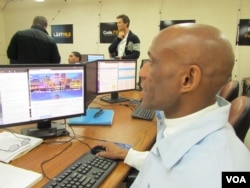Only 20 miles separate San Quentin State Prison from California's affluent San Francisco Bay Area, but for most of the men incarcerated there, the gap between them and the city’s high tech world seemed insurmountable — until now.
That's because some of them are learning computer coding, one of the most coveted skills on the job market.
Started by The Last Mile, a San Francisco non-profit founded by tech industry veterans Chris Redlitz and Beverly Parenti, San Quentin’s coding boot camp is the first of its kind in a prison setting.
It was on his first visit to San Quentin that Redlitz came up with the idea of giving prisoners marketable skills to help them re-enter society when they get out.
Startup behind bars
According to Parenti, she initially thought the idea was crazy.
“My first reaction was, ‘Are you kidding?’" she said. “And then I actually went in and met some of the men and learned some of their stories. I saw their passion and enthusiasm and intelligence, and I quickly agreed that I would help Chris launch the Last Mile inside San Quentin."
It was not an easy task. The first problem was lack of Internet access. U.S. prisons do not allow inmates to get online, so Redlitz turned to the coding school Hack Reactor — a group that provides volunteer instructors who broadcast lessons into the classroom from a remote location — and they developed a program that doesn't require connectivity.
The second problem, which was encountered when the program finally began last year, was that half the prisoners taking the course had no computer experience.
For Gary Valentino Hollis, who has been serving a 20-year sentence for attempted murder, learning to write code was like learning a foreign language.
“I mean, I don’t even know how to turn on a [smartphone]; I don’t even have a clue what an app is or how to turn it on," he said. "There’s times I feel very very frustrated — but to give up, it’s not in the blood. There’s not one guy in here that has that on their minds. We all work as a team.
"See up here on the wall, it says, ‘Believe In The Process,'" he said, pointing. "That’s what it’s about — believing in the process. Keep working and it eventually clicks."
Hollis and his 17 classmates spend ten hours a day, four days a week learning coding language. The intense six-month course requires commitment: the Last Mile has a zero-tolerance policy, and if students miss class or misbehave, they are immediately expelled.
A new chance
Hollis will be graduating from the coding class in April, just in time for his release.
“This is truly an honor and a blessing to be in this type of setting, especially here in prison," he said. "This is a million-dollar dream because it gives a lot of men hope. I’m getting out in 108 days, but who’s counting? Getting out, I know I have a skill now I can market to provide for me and my family and to be a more productive citizen than I was 20-some years ago. Everyone deserve a new chance, so this is my new chance, my new way of life."
But Redlitz says he has high hopes for all of them.
“You know, the opportunities are huge, especially in this industry," he says. "If you can write great code, people really don’t care much about your background. It really resolves a lot of issues that we’ve had in the past.
"You know, it’s sort of checking the box, right? 'I’m an ex-felon and I don’t qualify for the job.' In this particular industry, it doesn’t matter," he adds. "Just write great code and you’ve got a job."
When these prisoners graduate from the course and finish their sentences, they’ll have completed the last mile, and many hope that they won’t return to prison after securing jobs with good pay.
Redlitz and Parenti are hoping to expand The Last Mile and bring it to other prisons in California and the west coast.







